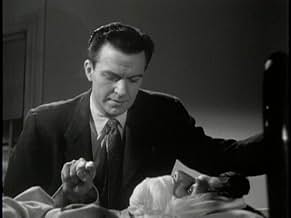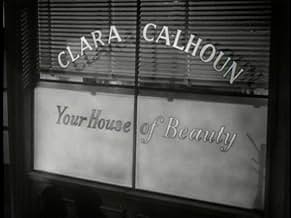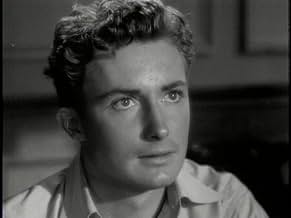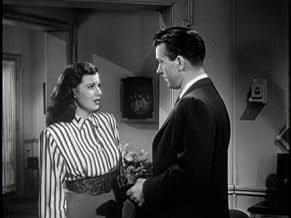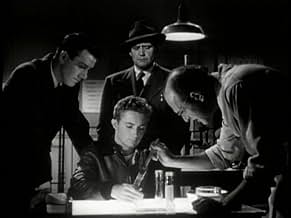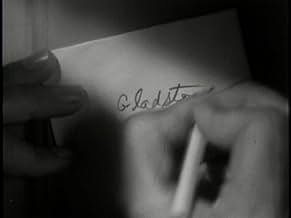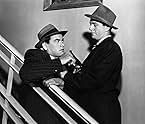IMDb RATING
6.6/10
1.9K
YOUR RATING
A beautician and her crooked boyfriend attempt to rob the bookie operation located in the back room, but when the plan goes wrong, they frame an innocent man.A beautician and her crooked boyfriend attempt to rob the bookie operation located in the back room, but when the plan goes wrong, they frame an innocent man.A beautician and her crooked boyfriend attempt to rob the bookie operation located in the back room, but when the plan goes wrong, they frame an innocent man.
Gordon B. Clarke
- Club Pianist
- (uncredited)
Ellen Corby
- Mrs. Wills
- (uncredited)
Kenneth Farrell
- Burns
- (uncredited)
Herschel Graham
- Nightclub Patron
- (uncredited)
Mira McKinney
- Beauty Salon Owner
- (uncredited)
Philip Morris
- Guard
- (uncredited)
Paul Power
- Nightclub Patron
- (uncredited)
- Director
- Writers
- All cast & crew
- Production, box office & more at IMDbPro
Featured reviews
Railroaded (1947)
An almost amazing movie, well made, beautifully photographed, held back by a stiff script but still it manages. And it has a dark current that makes it both creepy and contemporary. Director Anthony Mann seems to have made a dozen great films that are just under the radar, noirs and westerns that have some edge to them to keep them from falling into the abyss of their genres.
This is Mann at his mature earliest. He had made a few films in the earlier 40s, but this, along with "Desperate," marks his coming into his own. Yes, you might find too much of a formula at work here, but it's not derivative, just a little stilted in the dialog. And yes, you might ask, near the beginning, why the cops couldn't see how easy the frame up would be (anyone could have stolen the truck and committed the crime), but remember, this one fact was supported by several others, including an eyewitness confirmation. So, once over these humps, you are for a good ride.
Who to watch for amongst these relative unknowns? John Ireland, most of all, for his bad guy personification, all charm and heartlessness, simultaneously. His girlfriend, played by Sheila Ryan, is his match, in a sharp performance also dripping with selfish cruelty, but tempered, critically, by doubt and remorse.
The third star is the little known cinematographer Guy Roe, who must have been inspired by the young, rising director. The filming right from the opening, subtle crane shot of the beauty parlor facade is artfully gorgeous without becoming baroque the way Orson Welles had become (beautifully) by 1947 with "The Lady from Shanghai." Both are great examples of where the movies were just after the war, both with a dark, brooding, searching uncertainty. And both showing off the amazing movie-making machinery of post-War Hollywood. I say this because both films were smaller budget affairs, and yet they have uncompromised production.
Give this a serious look. It's imperfect, for sure, but it has such high points, including some dark dark filming that is so kinetic and scary it surprised even an old film noir fan like me, you'll be glad.
An almost amazing movie, well made, beautifully photographed, held back by a stiff script but still it manages. And it has a dark current that makes it both creepy and contemporary. Director Anthony Mann seems to have made a dozen great films that are just under the radar, noirs and westerns that have some edge to them to keep them from falling into the abyss of their genres.
This is Mann at his mature earliest. He had made a few films in the earlier 40s, but this, along with "Desperate," marks his coming into his own. Yes, you might find too much of a formula at work here, but it's not derivative, just a little stilted in the dialog. And yes, you might ask, near the beginning, why the cops couldn't see how easy the frame up would be (anyone could have stolen the truck and committed the crime), but remember, this one fact was supported by several others, including an eyewitness confirmation. So, once over these humps, you are for a good ride.
Who to watch for amongst these relative unknowns? John Ireland, most of all, for his bad guy personification, all charm and heartlessness, simultaneously. His girlfriend, played by Sheila Ryan, is his match, in a sharp performance also dripping with selfish cruelty, but tempered, critically, by doubt and remorse.
The third star is the little known cinematographer Guy Roe, who must have been inspired by the young, rising director. The filming right from the opening, subtle crane shot of the beauty parlor facade is artfully gorgeous without becoming baroque the way Orson Welles had become (beautifully) by 1947 with "The Lady from Shanghai." Both are great examples of where the movies were just after the war, both with a dark, brooding, searching uncertainty. And both showing off the amazing movie-making machinery of post-War Hollywood. I say this because both films were smaller budget affairs, and yet they have uncompromised production.
Give this a serious look. It's imperfect, for sure, but it has such high points, including some dark dark filming that is so kinetic and scary it surprised even an old film noir fan like me, you'll be glad.
Railroaded! (1947)
*** (out of 4)
Anthony Mann directed this thriller, which has a Detective (Hugh Beaumont) trying to clear an innocent man of murder charges. The Detective eventually falls for the suspect's sister (Sheila Ryan), which leads to a wannabe gangster (John Ireland) who we know is the real killer. This is a pretty suspenseful and highly entertaining little film that has a whole lot going for it. Mann does a terrific job at keeping the film moving very nicely and he has enough interesting characters for two films. This was my first time seeing Beaumont outside of his role of the father on Leave it to Beaver and I was shocked to see how well he played a tough guy. His Detective has all the charm, energy and toughness, which is expected in a film like this. Ireland is terrific as the thug and Ryan does a nice job, although she's not on the same level as the two men. There's also a wonderful fight between two women, which has to be seen to be believed.
*** (out of 4)
Anthony Mann directed this thriller, which has a Detective (Hugh Beaumont) trying to clear an innocent man of murder charges. The Detective eventually falls for the suspect's sister (Sheila Ryan), which leads to a wannabe gangster (John Ireland) who we know is the real killer. This is a pretty suspenseful and highly entertaining little film that has a whole lot going for it. Mann does a terrific job at keeping the film moving very nicely and he has enough interesting characters for two films. This was my first time seeing Beaumont outside of his role of the father on Leave it to Beaver and I was shocked to see how well he played a tough guy. His Detective has all the charm, energy and toughness, which is expected in a film like this. Ireland is terrific as the thug and Ryan does a nice job, although she's not on the same level as the two men. There's also a wonderful fight between two women, which has to be seen to be believed.
Once I got into collecting film-noir movies, I had to have this one, so I paid big bucks for the VHS. I say that because it added to my disappointment. The film is okay, but if you have really high expectations before seeing this, you'll probably be let down, as I was. I liked this more on the second viewing when I knew what to expect.
In the beginning, it dwells too long on the innocent man-being arrested theme but after that part is over, it picks up, but then bogs down again. For people who grew up watching "Leave It To Beaver" on TV, this film offers Hugh Beaumont as a main character. Since I did, I always find it interesting to see Beaumont in different roles. I also enjoyed ogling a pretty brunette, "Rosie," played by Sheila Ryan. The climax to this story was good, and it was surprisingly realistic. There was some decent film-noir photography in spots, too. Overall, okay but not what it's cracked up to be.
In the beginning, it dwells too long on the innocent man-being arrested theme but after that part is over, it picks up, but then bogs down again. For people who grew up watching "Leave It To Beaver" on TV, this film offers Hugh Beaumont as a main character. Since I did, I always find it interesting to see Beaumont in different roles. I also enjoyed ogling a pretty brunette, "Rosie," played by Sheila Ryan. The climax to this story was good, and it was surprisingly realistic. There was some decent film-noir photography in spots, too. Overall, okay but not what it's cracked up to be.
A faked robbery goes awry and a cop is killed, causing the perpetrators to frame an innocent kid to take the rap. What they don't foresee is the kid's stubborn sister.
John Ireland makes one nasty bad guy, and when he lovingly polishes that gunbarrel with perfumed bullets, we get the idea. Yes indeed, he's more than just a bad guy. The movie's a crime drama done in noirish style by the expert Anthony Mann. There's little of the hallmark ambiguity of classic noir in the characters. Nonetheless, there's the innocent kid Steve (Kelly) who looks to be the victim of a malevolent noirish fate. Of course, there has to be a cheap dame in the crime mix, and Jane Randolph flops around effectively as Duke's (Ireland) brassy blonde punching bag.
Note how the movie starts out in slam-bang fashion, and how effectively Mann uses close- ups, especially of the suddenly terrified Marie (Converse), to turn screen violence into a sense of real violence. This, I think, was a Mann specialty and one reason he's treasured by fans of noir. Then too, that shootout in the shadowy nightclub amounts to a clever touch of visual imagination. No, the story itself is not exactly novel, while Beaumont makes the kind of cop you'd expect from Beaver Cleaver's dad. Still, the movie's done with style and conviction, with an outstanding turn from Ireland, and rightfully belongs in the canon of 40's noir.
John Ireland makes one nasty bad guy, and when he lovingly polishes that gunbarrel with perfumed bullets, we get the idea. Yes indeed, he's more than just a bad guy. The movie's a crime drama done in noirish style by the expert Anthony Mann. There's little of the hallmark ambiguity of classic noir in the characters. Nonetheless, there's the innocent kid Steve (Kelly) who looks to be the victim of a malevolent noirish fate. Of course, there has to be a cheap dame in the crime mix, and Jane Randolph flops around effectively as Duke's (Ireland) brassy blonde punching bag.
Note how the movie starts out in slam-bang fashion, and how effectively Mann uses close- ups, especially of the suddenly terrified Marie (Converse), to turn screen violence into a sense of real violence. This, I think, was a Mann specialty and one reason he's treasured by fans of noir. Then too, that shootout in the shadowy nightclub amounts to a clever touch of visual imagination. No, the story itself is not exactly novel, while Beaumont makes the kind of cop you'd expect from Beaver Cleaver's dad. Still, the movie's done with style and conviction, with an outstanding turn from Ireland, and rightfully belongs in the canon of 40's noir.
John Ireland's portrayal of a cold obsessed killer is the best thing in this movie. His performance is edgy, sexy and menacing. A brutal thug who loves his gun. Unfortunately he is hampered by a weak script, where his actions often make little sense. (For instance, why would he contact the sister of the suspect he framed?). Jane Randolph is also strong as the moll, although her character seems to change midway through the movie.
One of the first noir films directed by Anthony Mann, the movie is well shot, fast paced, tightly edited and tough. One wishes the focus could have stayed on Ireland, or, alternatively, the strong scenes of Ed Kelly being framed and pushed around by the cops. Mann will better develop these themes in his later films (noirs and westerns). Still a pretty enjoyable movie and a must for film noir fans.
One of the first noir films directed by Anthony Mann, the movie is well shot, fast paced, tightly edited and tough. One wishes the focus could have stayed on Ireland, or, alternatively, the strong scenes of Ed Kelly being framed and pushed around by the cops. Mann will better develop these themes in his later films (noirs and westerns). Still a pretty enjoyable movie and a must for film noir fans.
Did you know
- TriviaA policeman says, "The more I see of them [criminals], the more I love my dog." This was originally said by the French author Mme. de Sevigne, but she meant "them" to refer to all men.
- GoofsReading from a book, Jackland Ainsworth quotes, "Some women should be struck regularly - like gongs", adding, "That's from Oscar Wilde, you know." In fact, it's a quotation from Noel Coward's play, "Private Lives".
- ConnectionsReferences Fortunes rapides (1931)
- How long is Railroaded!?Powered by Alexa
Details
- Release date
- Country of origin
- Official sites
- Language
- Also known as
- Railroaded!
- Filming locations
- Production company
- See more company credits at IMDbPro
Box office
- Budget
- $500,000 (estimated)
- Runtime
- 1h 12m(72 min)
- Color
- Aspect ratio
- 1.37 : 1
Contribute to this page
Suggest an edit or add missing content


